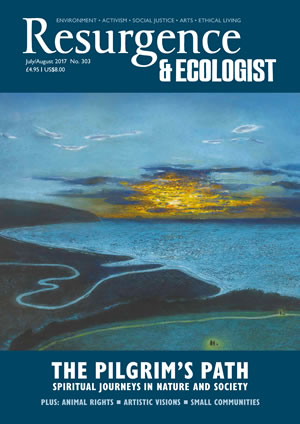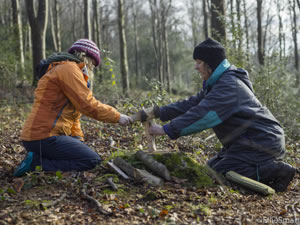People made vulnerable by life circumstances spend whole days in local woods, cooking and eating round a fire, talking, playing games, making simple wooden objects, being very active or spending quiet time. Through their time spent here, they are learning about the connections between ourselves, each other and the rest of the world.
Nature Workshops is a South West-based social enterprise running specialised sessions in collaboration with local charities supporting vulnerable people and training others to develop the skills to become practitioners. Our research and that of others has shown that time spent in natural spaces in this way can alleviate negative feelings, improve optimism about the future and help people to stop drug therapy.
We run our sessions in woods local to our clients and have developed relationships with landowners all over the UK. For lasting impact participants attend one day a week for six weeks for a total of 30 hours’ contact time. The first sessions are fast-moving and packed with activity, and over time, as skills are built and we grow to understand needs, the session content becomes influenced more and decided upon by participants.
One 48-year-old woman was able to come off the anti-psychotic drugs she had been taking following an abusive childhood that had resulted in years of psychopathy. She was also able to make a fire in her grate in her home for the first time and to use simple carpentry tools to make useful objects. As we worked with her we noticed subtle changes in her behaviour. She became less self-conscious, telling stories round the fire as she visibly relaxed over time.
In another project we worked with young people who are carers for their parents. (Their parents might have physical disabilities or mental health issues or be recovering addicts.) Two brothers came whose mother is an ex-servicewoman with multiple sclerosis, which has led to facial deformities. Both boys had behavioural issues at school resulting from bullying and teasing because of their mum’s appearance at the school gate.
During the sessions, the elder brother made comments like, “I wish I could come every day,” and, “The main thing about thing about all of this is the teamwork.”
His teacher said afterwards: “He seems calmer, not so aggressive; he doesn’t seem as moody or grumpy.” His mum said: “He seems to be at a stage where he’s not so paranoid about leaving me. He’s grown a bit more understanding. He’s giving me a lot more space where he wouldn’t usually leave me. His confidence has grown in a lot of ways.”
His younger brother, aged nine, wrote this poem on the last day:
Above I see tall trees
Below I see my little nest
Inside I feel happy that I came
All the participants in the adult programme suffer from severe or enduring mental health conditions such as schizophrenia, psychosis or depression. They often come from home environments where they have daily low-level trauma that can escalate at any moment. Everyone who completed the programme received an accredited qualification. For all but one this was their first certificate.
The top most referenced outcomes for the young people were feelings of being safe and supported in social situations, developing themselves, and connecting with others through shared beliefs. One participant commented: “It’s helped me see things in a different light... The reflections of the sun shining in through the trees’ leaves, and how the wind blew in a peaceful way, and it felt like being in a different world... And it made [me] feel like I’d like to kind of live in that situation.”
The impact of the programmes was measured using the quantitative tools the Warwick and Edinburgh–Mental Wellbeing Scale (WEMWBS) with the adults, and the Emotional Literacy Checklist with the young people, their parents and their teachers. We used various qualitative measures, including a Nature connectedness scale. A set of wellbeing indicators and coded transcripts from interviews before, during and after the intervention allowed for baselines to be set. Expressed hopes and expectations were revisited at the end of the programme.
The research shows that the participants, their referrers and staff all found that the sessions helped develop practical and personal skills, with measurable improvements in self-esteem and resilience. The most significant improvements were in helping people feel optimistic about their future and increasing their feelings of closeness to the natural world.
Both projects were part of the Good from Woods scheme, which was run with Sue Waite at the Education Department via the University of Plymouth.
Following the success of this project, Nature Workshops have worked on several programmes in woodlands, moorlands and beaches, targeting individuals with mental health problems. Their combined WEMWBS data gathered to date has shown a 23% increase in wellbeing in the participants after attending the programme.
We are hoping this type of work will grow in popularity, especially as the cost benefits for mental health bills are realised. Having now spent many hours in and around camps, I am impressed by how physically adapted we are to these activities. This might explain the positive psychological effects. It might be that our limbic brain enjoys the confluence of these ancient pastimes.
We could also debate about what we mean by natural spaces or the relevance of rural or urban living or why a boy was prescribed Ritalin for bullying, rather than the bullying being addressed to start with. I would argue that the time for debate is over. When our collective focus is on finding practical solutions for conservation and climate change, citizenship and wellbeing, now and for the future, we make an unstoppable movement.







